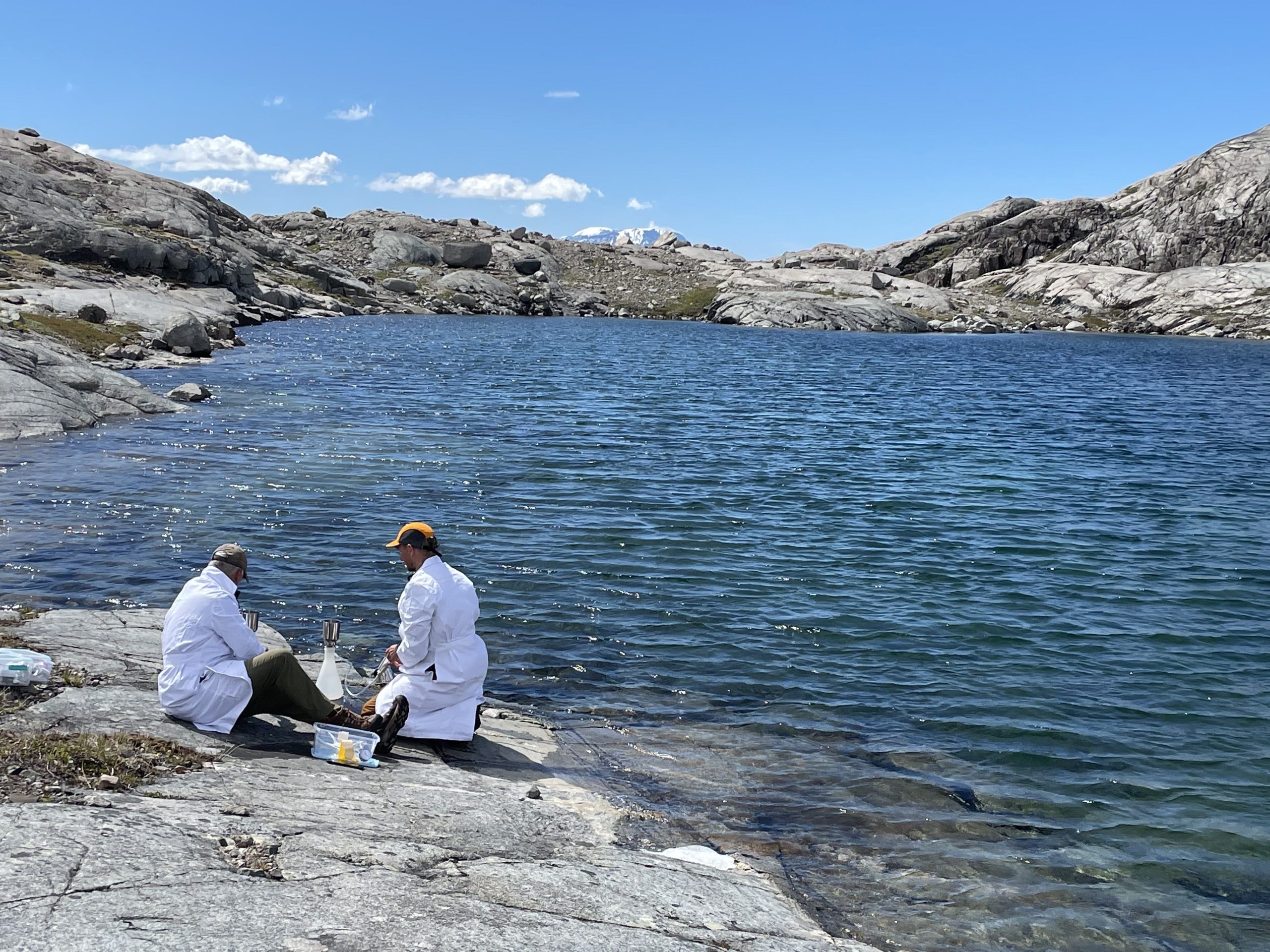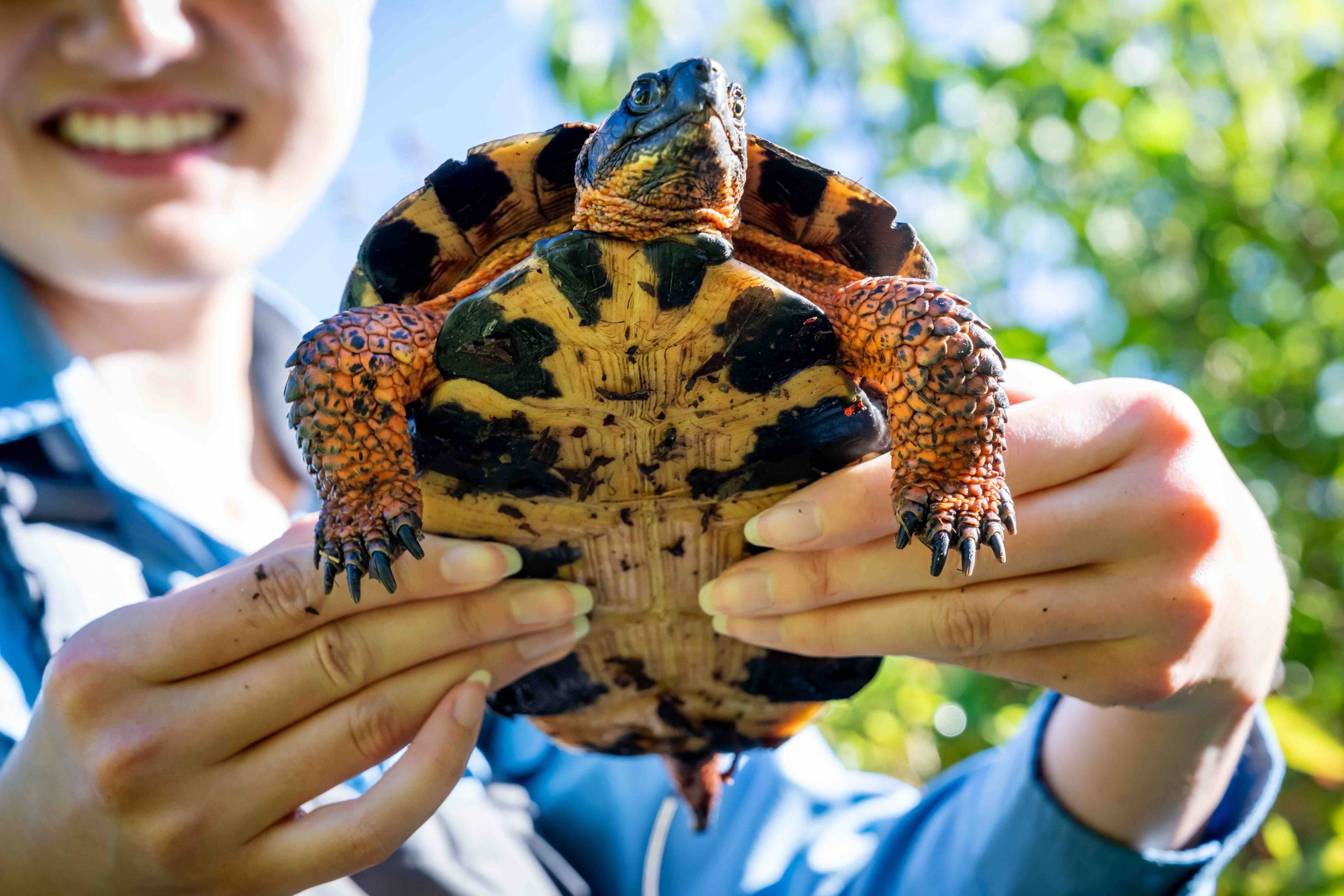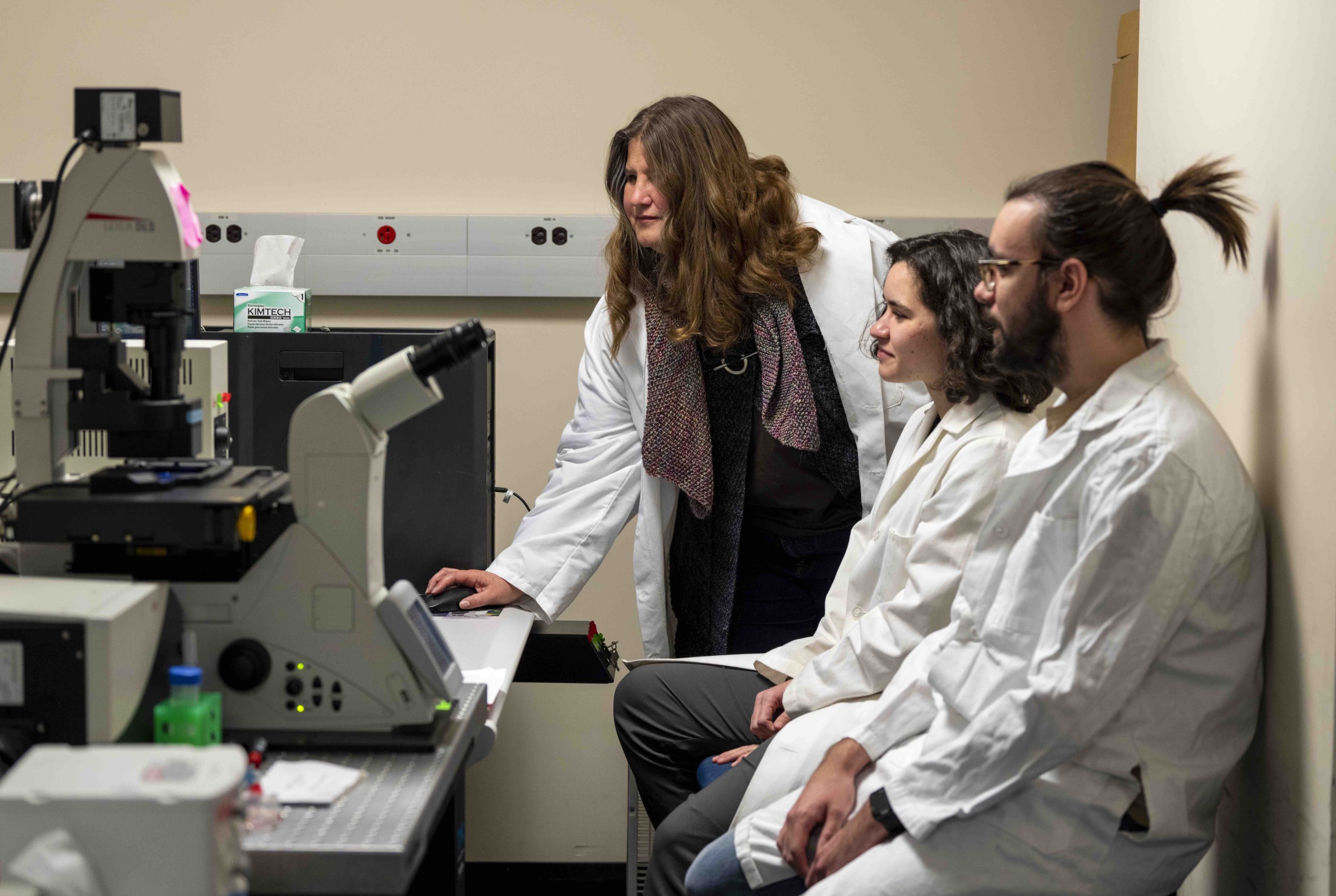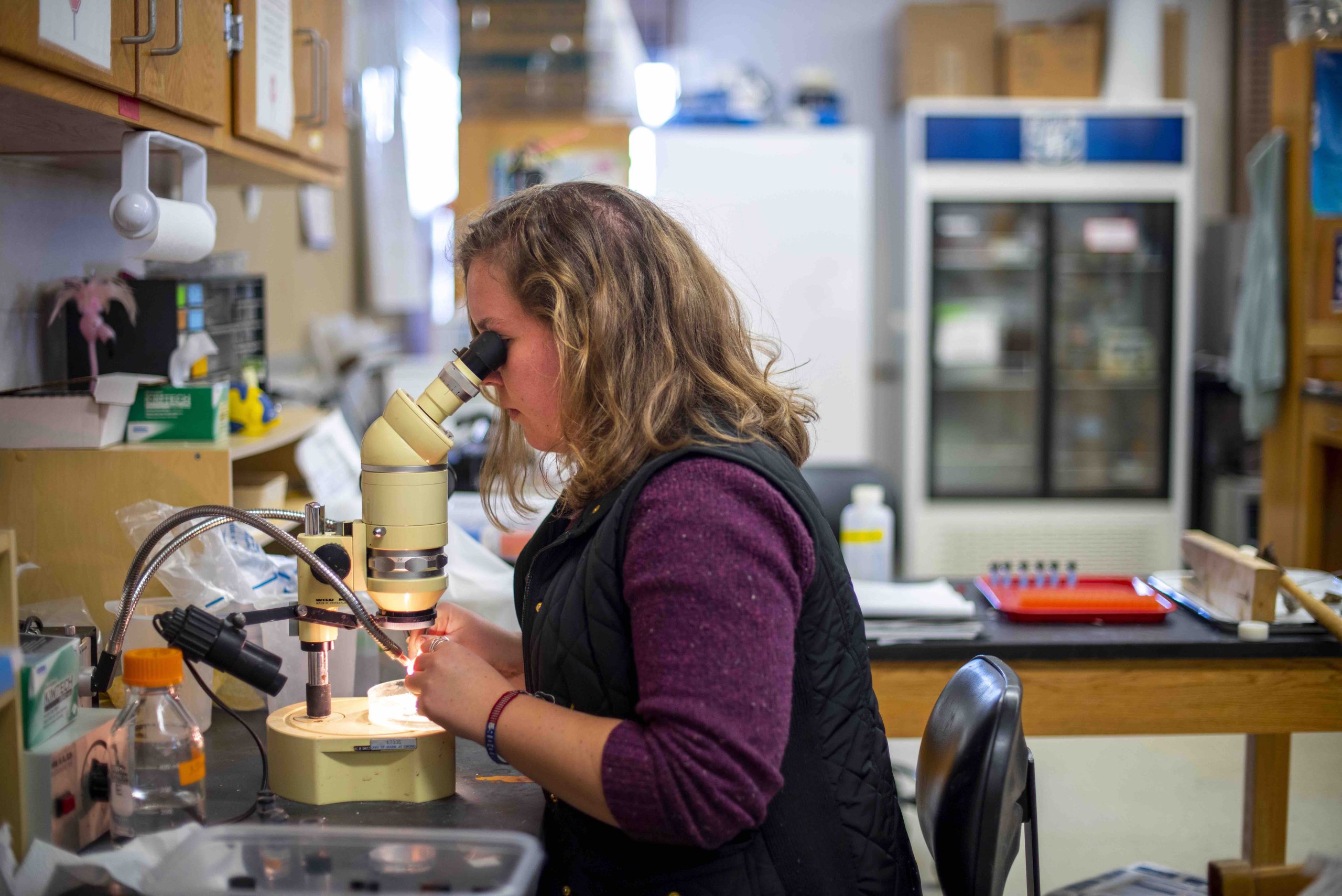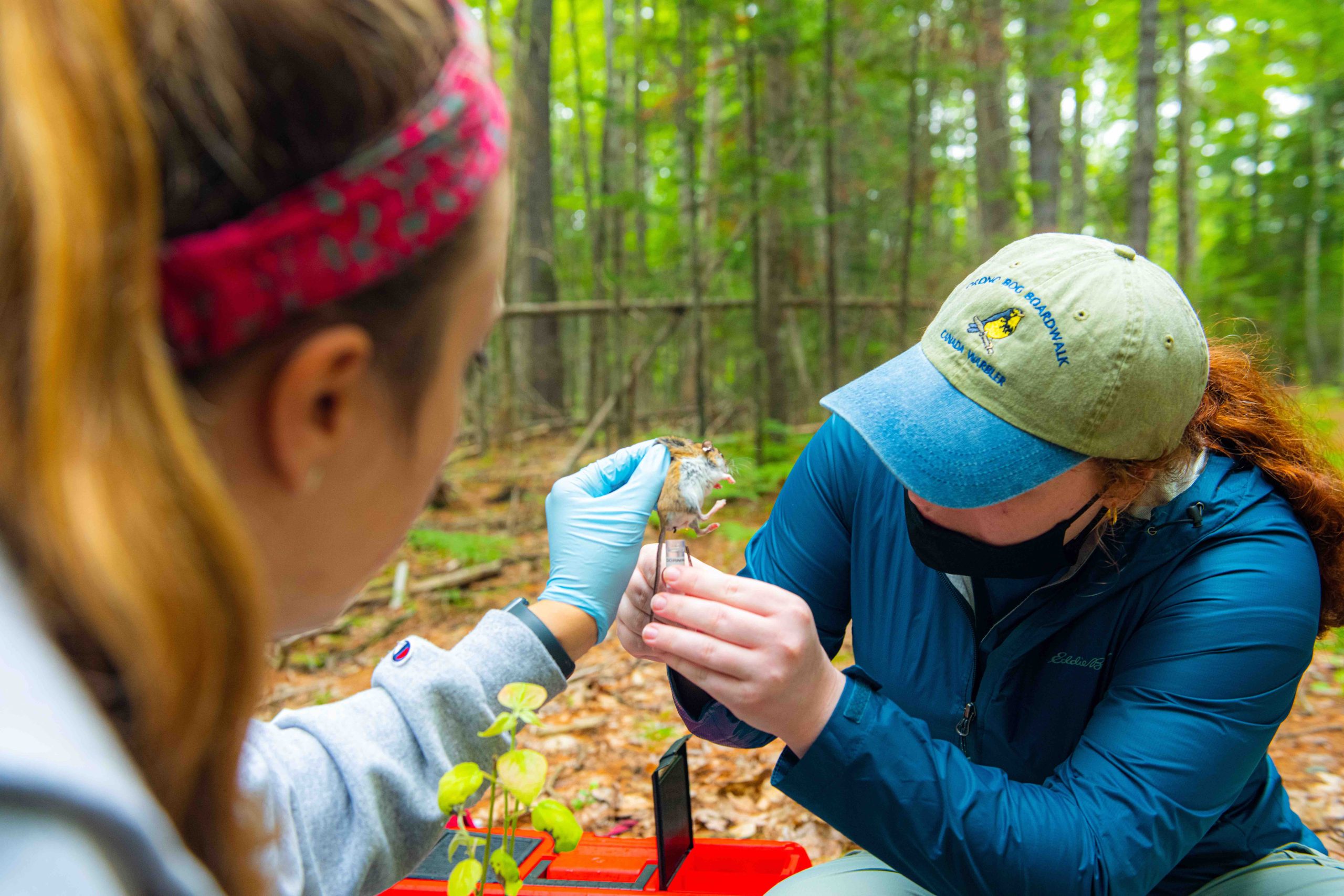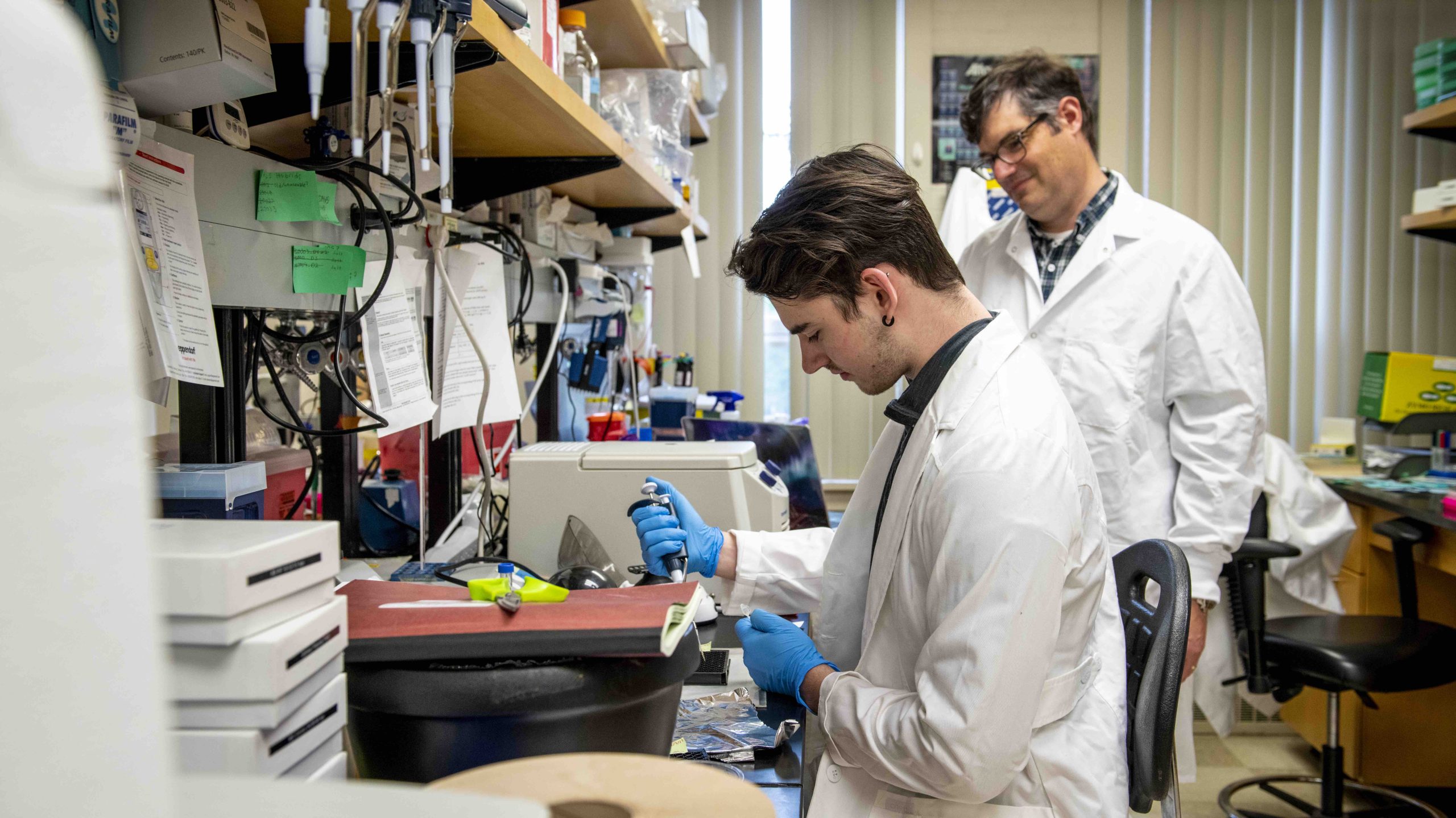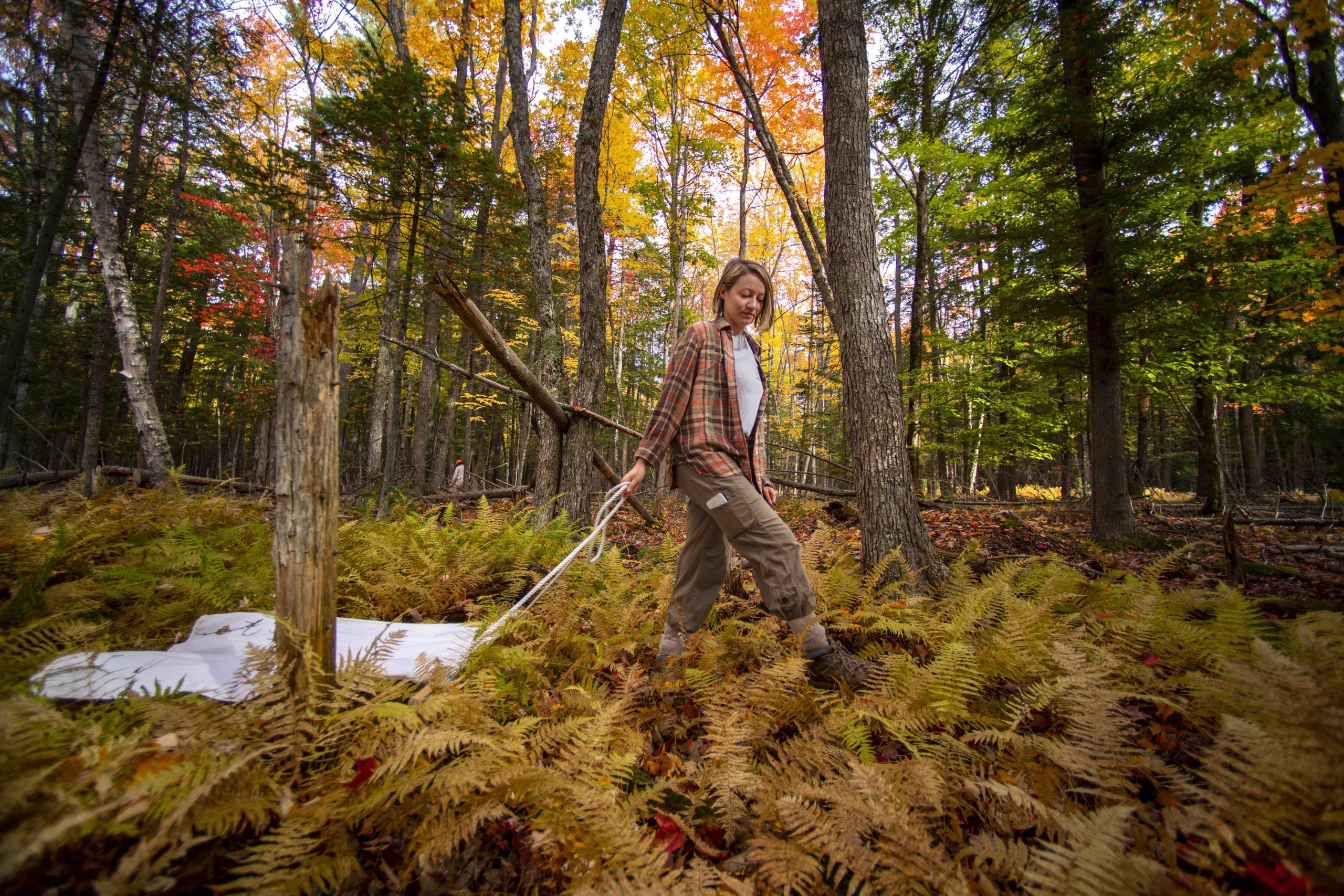Research Focus Clusters for Graduate Study
Aquatic Ecology
Current research projects of SBE faculty in aquatic ecology deal with issues concerning endangered aquatic species, invasive species, lake-shore development, the effects of dams and dam removal, point and non-point source pollution, aquatic community structure, and aquatic restoration.
Many of the research goals are being met through external collaborations and campus interactions with entities such as the Senator George Mitchell Center, the Climate Change Institute, the Department of Wildlife Ecology, the Department of Resource Economics and Policy, USGS, USDA-NRI, and Maine Agricultural and Forest Experiment Station.
Our research is funded by a wide range of sources outside Maine, including the National Science Foundation, U.S. Fish and Wildlife Service, National Park Service, National Oceanic and Atmospheric Administration, U.S. Environmental Protection Agency, and the U.S. Department of Agriculture. Our scientists cooperate with faculty in the Department of Wildlife Ecology, the Department of Natural Resource Management and Policy, the School of Marine Sciences, the USGS, and the Senator George J. Mitchell Center for Environmental & Watershed Research.
Aquatic Ecology – Faculty Members

Allison Gardner
Associate Professor of Arthropod Vector Biology
allison.gardner@maine.edu
207.581.3115
Medical entomology, vector-borne disease ecology, epidemiology.

Hamish Greig
Professor of Stream Ecology and Associate Director of SBE
hamish.greig@maine.edu
207.581.2648
Community ecology, environmental gradients, global change; aquatic ecology, freshwater invertebrates.

Michael T. Kinnison
Professor of Evolutionary Applications
mkinnison@maine.edu
207.581.2575
Contemporary evolution, Eco-evolutionary dynamics, population and conservation genetics; fish biology

Brian McGill
Professor of Biological Sciences, joint appointment Sustainability Solutions Initiative
brian.mcgill@maine.edu
207.581.2680
Large scale ecology and global change

Brian Olsen
Professor of Ornithology
brian.olsen@maine.edu
207.581.2542
Avian ecology, behavior, demography, mating systems, and life history evolution

Jasmine E. Saros
Professor of Paleoecology and Biological Sciences
jasmine.saros@maine.edu
207.581.2112
Paleolimnology, phytoplankton ecology, lake ecosystem response to global change

Erin Grey
Associate Professor of Aquatic Genetics
erin.grey@maine.edu
(207) 581-2541
Biodiversity, genetics, connectivity, invasive species, larval ecology, environmental DNA.

Kate Ruskin
Senior Lecturer and Undergraduate Coordinator in Ecology and Environmental Sciences
katharine.ruskin@maine.edu
207.581.3177
Conservation, global change ecology, birds, population biology, tidal marshes
Behavioral Ecology
Whether focused on birds, fish, or other organisms, SBE faculty are investigating a wide range of fascinating questions regarding the behavioral ecology of interacting species and the evolutionary origins of behavior.
Behavioral Ecology – Faculty Members

Andrei Alyokhin
Professor of Applied Entomology
alyokhin@maine.edu
207.581.2977
Applied insect ecology, evolution, insect behavior, and integrated pest management.

Brian Olsen
Professor of Ornithology
brian.olsen@maine.edu
207.581.2542
Avian ecology, behavior, demography, mating systems, and life history evolution

Michael T. Kinnison
Professor of Evolutionary Applications
mkinnison@maine.edu
207.581.2575
Contemporary evolution, Eco-evolutionary dynamics, population and conservation genetics; fish biology

Danielle Levesque
Associate Professor of Mammalogy and Mammalian Health
danielle.l.levesque@maine.edu
207.581.2511
Evolutionary physiology, thermoregulatory biology, physiological ecology, hibernation/torpor, mammals

Angela Mech
Associate Professor of Forest Entomology
angela.mech@maine.edu
207-581-2984
Forest entomology, invasion ecology, insect biodiversity, forest health

Allison Gardner
Associate Professor of Arthropod Vector Biology
allison.gardner@maine.edu
207.581.3115
Medical entomology, vector-borne disease ecology, epidemiology.

Matthew Chatfield
Associate Professor of Evolution and Eco-Health
matthew.chatfield@maine.edu
207.581.2568
Ecology, evolution, conservation, and population-level health of reptiles and amphibians.

Phil Fanning
Assistant Professor of Agricultural Entomology
philip.fanning@maine.edu
207-581-2989
Integrated Pest Management, Biological Control, Applied Insect Ecology.
Biomedical Research
SBE faculty focus their research on animals and participate in the translation of basic research on model organisms to treating disease in humans. Developmental biologists in the faculty study embryonic development of muscle and nerve tissues and their interactions and genetic regulatory mechanisms, with direct applicability to treating disease. Faculty within this cluster are cooperating members of the Graduate School of Biomedical Sciences, which involves collaboration with biomedical research institutions across the state such as The Jackson Laboratory, the Maine Medical Research Institute, the Maine Institute for Human Genetics and Health, and the Mount Desert Island Biological Laboratory. On campus, SBE faculty collaborate with members of the Department of Molecular and Biomedical Research, the School of Marine Sciences, the Ecology and Environmental Sciences program. Funding for this research comes from national sources such as the National Institutes of Health, the National Science Foundation, and the Muscular Dystrophy Association.
Biomedical Research – Faculty Members

Clarissa Henry
Professor of Biological Sciences
clarissa.henry@maine.edu
207.581.2816
Cell and molecular biology of segmentation and muscle development in Zebrafish.

Jared Talbot
Associate Professor of Developmental Biology
jared.talbot@maine.edu
207.581.2835
Muscle development; cell migration; vertebrate genetics

Zhao Xuan
Assistant Professor of Biological Sciences
zhao.xuan@maine.edu
207.581.2470
Cellular and molecular biology of the neuron; synapse development; invertebrate genetics
Genetics
Genetics is a major unifying theme of research at SBE through its importance in integrative cellular, organismal, and evolutionary biology. We apply tools of genomics, forward genetics, biochemistry, microscopy, computational modeling and bioinformatics to tackle questions about a variety of animal and plant models. We study, for instance, muscle and nerve morphogenesis in vertebrate and invertebrate models, breeding in plant models, and environmental microbiomes. How students grasp and learn to apply concepts of genetics is also a special focus of our research on undergraduate learning. Research projects in genetics at SBE are supported by the major federal agencies in science such as the National Institutes of Health, the National Science Foundation, and the U.S. Department of Agriculture, and by various non-profit organizations and commodity boards of the U.S. and Maine. Collaborative partnerships with other scientists on campus (Dept. of Molecular and Biomedical Sciences, School of Marine Sciences, RISE Center) and across the state (The Jackson Laboratory, Mount Desert Island Biological Laboratory, Eastern Maine Medical Center, Maine Medical Center Research Institute) are critical to the broad reach and applicability of our research.
Genetics – Faculty Members

Clarissa Henry
Professor of Biological Sciences
clarissa.henry@maine.edu
207.581.2816
Cell and molecular biology of segmentation and muscle development in Zebrafish.

Jared Talbot
Associate Professor of Developmental Biology
jared.talbot@maine.edu
207.581.2835
Muscle development; cell migration; vertebrate genetics

Zhao Xuan
Assistant Professor of Biological Sciences
zhao.xuan@maine.edu
207.581.2470
Cellular and molecular biology of the neuron; synapse development; invertebrate genetics

Ek Han Tan
Associate Professor of Plant Genetics
ekhtan@maine.edu
207.581.2995
Plant genetics and genomics, genome elimination, potato breeding, chromothripsis

Peter Avis
Assistant Professor in Ecosystem Genetics
peter.avis@maine.edu
Fungal biology, ecology, biogeography and evolution; molecular ecology, biomonitoring

Erin Grey
Associate Professor of Aquatic Genetics
erin.grey@maine.edu
(207) 581-2541
Biodiversity, genetics, connectivity, invasive species, larval ecology, environmental DNA.

Seanna Annis
Director of SBE / Professor of Mycology
sannis@maine.edu
207.581.2551 (Director phone); 207.581.2621 (Faculty office phone)
Physiological, molecular, and field studies of fungal pathogens of blueberries; research on molds affecting food.

José Eduardo (Dudu) Meireles
Associate Professor of Plant Evolution and Systematics
jose.meireles@maine.edu
207.581.2529
Plant phylogenetics, population genetics, biogeography, macroevolution, and evolutionary ecology

Michael T. Kinnison
Professor of Evolutionary Applications
mkinnison@maine.edu
207.581.2575
Contemporary evolution, Eco-evolutionary dynamics, population and conservation genetics; fish biology
Ecophysiology and Stress Physiology
Multicellular organisms have evolved intricate physiological and developmental mechanisms in adaptation to a constantly changing environment. We study these mechanisms in a variety of animals, plants, and fungi, and work on translation of basic research findings to real-world applications in conservation biology, agriculture, and human medicine. In particular, our recent research has concentrated on physiological adaptation by plants to stresses such as drought, freezing, and fungal pathogens, and animal response to high temperature stresses.
Ecophysiology and Stress Physiology – Faculty Members

Seanna L. Annis
Director of SBE/ Professor of Mycology
sannis@maine.edu
207.581.2551 (Director phone); 207.581.2621 (Faculty office phone)
Physiological, molecular, and field studies of fungal pathogens of blueberries; research on molds affecting food

Danielle L. Levesque
Associate Professor of Mammalogy and Mammalian Health
danielle.l.levesque@maine.edu
207.581.2511
Evolutionary physiology, thermoregulatory biology, physiological ecology, hibernation/torpor, mammals
Systematics and Evolutionary Biology
As an interdisciplinary school with roots in an array of research fields, SBE investigates questions on evolution, adaption, and diversification of a broad variety of organisms, including fungi, seed-bearing plants, and vertebrate and invertebrate animals. We study evidence for contemporary evolutionary change, adaptations species make as they invade novel environments, the role of evolutionary change in ecological processes, functional morphology, and the systematics of various taxa among the fungi, plants, and animals. Mechanisms of speciation and implications of contemporary evolution for conservation biology are especially important fields of research in SBE.
Our research is funded by a variety of sources, from national (e.g., the National Science Foundation, the US Department of Agriculture, the National Oceanic and Atmospheric Administration, and US Fish & Wildlife) to local interests (e.g., blueberry growers, Maine Department of Inland Fisheries and Wildlife), and it involves cooperative effort with other departments dealing with aspects of biodiversity and conservation biology, such as the Department of Wildlife Ecology, the School of Marine Sciences, the School of Forestry, the Ecology and Environmental Sciences program, and the Climate Change Institute.
Systematics and Evolutionary Biology – Faculty Members

Joyce E. Longcore
Associate Research Professor
longcore@maine.edu
207.581.4396
Diversity, systematics and phylogeny of the Chytridiomycota. Batrachochytrium dendrobatidis, the chytrid pathogen of amphibians

Brian Olsen
Professor of Ornithology
brian.olsen@maine.edu
207.581.2542
Avian ecology, behavior, demography, mating systems, and life history evolution

Michael T. Kinnison
Professor of Evolutionary Applications
mkinnison@maine.edu
207.581.2575
Contemporary evolution, Eco-evolutionary dynamics, population and conservation genetics; fish biology

Matthew Chatfield
Associate Professor of Evolution and Eco-Health
matthew.chatfield@maine.edu
207.581.2568
Ecology, evolution, conservation, and population-level health of reptiles and amphibians.

Peter Avis
Assistant Professor in Ecosystem Genetics
peter.avis@maine.edu
Fungal biology, ecology, biogeography and evolution; molecular ecology, biomonitoring

Erin Grey
Associate Professor of Aquatic Genetics
erin.grey@maine.edu
(207) 581-2541
Biodiversity, genetics, connectivity, invasive species, larval ecology, environmental DNA.

Jacquelyn Gill
Professor of Paleoecology & Plant Ecology
jacquelyn.gill@maine.edu
207.581.2305
Paleoecology, community ecology, vegetation dynamics, extinction, climate change, biotic interactions.

José Eduardo (Dudu) Meireles
Associate Professor of Plant Evolution and Systematics
jose.meireles@maine.edu
207.581.2529
Plant phylogenetics, population genetics, biogeography, macroevolution, and evolutionary ecology
Ecology and Pest Management
SBE faculty members have research programs studying various aspects of ecology with wide ranging expertise. Research in this area is addressing major challenges facing society, including the influence of global change on natural resources; managing forest and agricultural pests and pathogens; disease vectors; water quality; conservation of threatened species; novel techniques to mitigate climate change effects, ecosystems that underlie fisheries and other ecosystem services. In addition, SBE researchers have made major conceptual advances in the links between populations, communities, and ecosystem dynamics; plant-insect interactions; and the ecology of disease. Funding for SBE’s research in comes from various US Department of Agriculture grant programs, the National Science Foundation, the National Park Service, and the Environmental Protection Agency. Much of this research involves collaboration with colleagues from the School of Forest Resources, the Department of Wildlife Ecology, the School of Food and Agriculture, and Cooperative Extension. Students working with SBE faculty have opportunities to work in a variety of natural and managed ecosystems around the state in cooperation with various agencies.
Ecology and Pest Management – Faculty

Seanna L. Annis
Director of SBE/ Professor of Mycology
sannis@maine.edu
207.581.2551 (Director phone); 207.581.2621 (Faculty office phone)
Physiological, molecular, and field studies of fungal pathogens of blueberries; research on molds affecting food

Andrei Alyokhin
Professor of Applied Entomology
alyokhin@maine.edu
207.581.2977
Applied insect ecology, evolution, insect behavior, and integrated pest management

Philip Fanning
Assistant Professor of Agricultural Entomology
philip.fanning@maine.edu
207-581-2989
Integrated Pest Management, Biological Control, Applied Insect Ecology

Matthew Chatfield
Associate Professor of Evolution and Eco-Health
matthew.chatfield@maine.edu
207.581.2568
Ecology, evolution, conservation, and population-level health of reptiles and amphibians.

Peter Avis
Assistant Professor in Ecosystem Genetics
peter.avis@maine.edu
Fungal biology, ecology, biogeography and evolution; molecular ecology, biomonitoring

Erin Grey
Associate Professor of Aquatic Genetics
erin.grey@maine.edu
(207) 581-2541
Biodiversity, genetics, connectivity, invasive species, larval ecology, environmental DNA.

Brian McGill
Professor of Biological Sciences, joint appointment Sustainability Solutions Initiative
brian.mcgill@maine.edu
207.581.2680
Large scale ecology and global change

Brian Olsen
Professor of Ornithology
brian.olsen@maine.edu
207.581.2542
Avian ecology, behavior, demography, mating systems, and life history evolution

Jasmine E. Saros
Professor of Paleoecology and Biological Sciences
jasmine.saros@maine.edu
207.581.2112
Paleolimnology, phytoplankton ecology, lake ecosystem response to global change

Jacquelyn Gill
Professor of Paleoecology & Plant Ecology
jacquelyn.gill@maine.edu
207.581.2305
Paleoecology, community ecology, vegetation dynamics, extinction, climate change, biotic interactions.

Amanda Klemmer
Associate Professor of Landscape Ecology
amanda.klemmer@maine.edu
207.581.4513
Food webs, aquatic/terrestrial connections, cross-ecosystem subsidies, invertebrate communities

Kate Ruskin
Senior Lecturer and Undergraduate Coordinator in Ecology and Environmental Sciences
katharine.ruskin@maine.edu
207.581.3177
Conservation, global change ecology, birds, population biology, tidal marshes

Allison Gardner
Associate Professor of Arthropod Vector Biology
allison.gardner@maine.edu
207.581.3115
Medical entomology, vector-borne disease ecology, epidemiology.

Angela Mech
Associate Professor of Forest Entomology
angela.mech@maine.edu
207-581-2984
Forest entomology, invasion ecology, insect biodiversity, forest health

